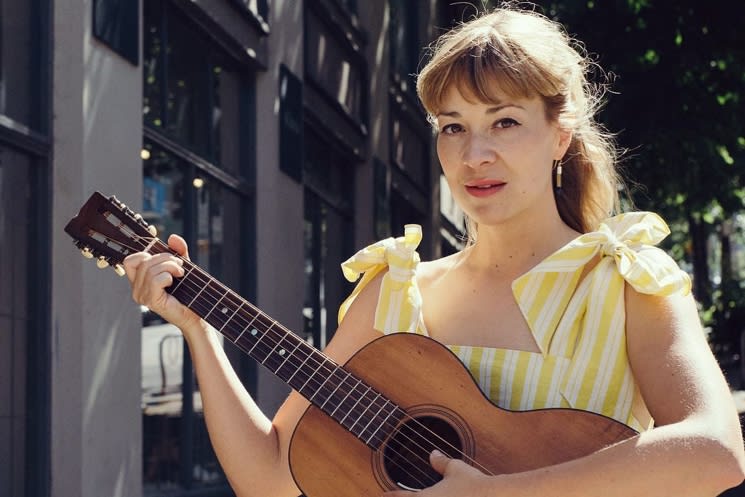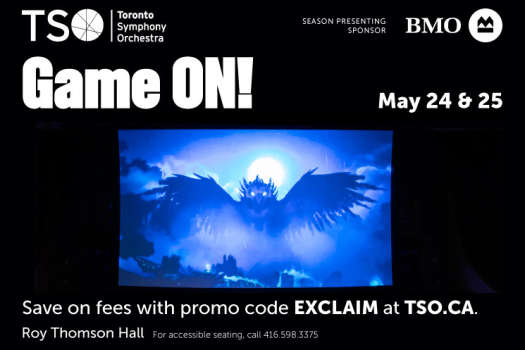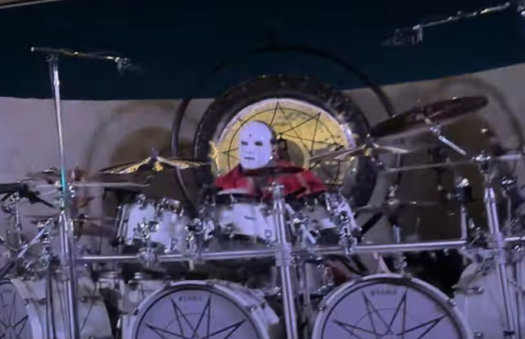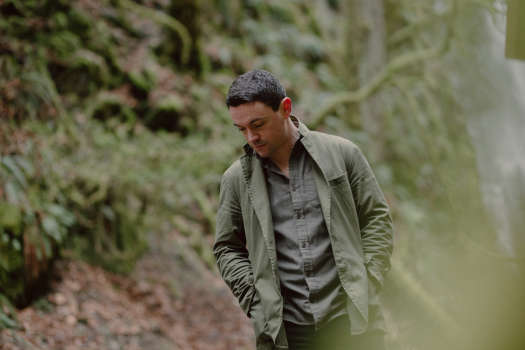Call it a COVID-19 twist on passing a tip jar around the bar — but this time, the coins have been replaced by PayPal transfers through Spotify's new "donate" button. When Jill Barber's manager suggested the Vancouver jazz singer take advantage of this feature — which the streaming giant touted as a new financial lifeline between artists and listeners during this concert-stifling pandemic — she was hesitant.
"I didn't want to come across as a charity case," Barber tells Exclaim!, adding that she has always been deeply self-assured of the value of her art, though she feels far more comfortable accepting fan funds via ticket sales and merch tables. "People say to artists, 'Oh, I'll buy your CD to support you.' Which is fine, but I want them to do it because they value what I do."
Her reluctance changed after the pandemic lockdowns had dragged on for months, drying up her primary source of income. After activating the "donate" feature, Barber's Spotify revenue stream suddenly shot up, from a prior occasional trickle, thanks to the generosity of one of her favourite Vancouver restaurateurs. Detailing the experience in a Facebook post, she wrote about paying that kindness forward, along with her desire to spread some good news during this dire time.
"I have a lot of pride in the work I do and the art I make, so it can be difficult to accept help," Barber says. However, the unprecedented disruption of COVID-19 has compelled Barber to look at her circumstances from "less of a capitalist model and more of a socialist one, where those with the means share with those struggling, so that we can come out of this still standing and with the music we enjoy."
A number of other Canadian artists have also enabled the donate button on their Spotify pages. Prime examples: Toronto punks METZ, Vancouver garage rockers Japandroids, and Haligonian rapper Classified. Their usage of the recently rolled out feature comes on the heels of a myriad of other musicians —including Canuck artists Fucked Up and Propagandhi — lambasting Spotify CEO Daniel Ek, who said back in July, "You can't record music once every three to four years and think that's going to be enough" to do well in today's music climate.
However, the streaming platform's Canadian head of artist and label partnerships, Nathan Wiszniak, tells Exclaim! that Spotify's company mission is "for a million creators to be able to live off their art. We've made great progress against this goal, but we know this is a difficult year for artists across the board." Therefore, the Artist Fundraising Pick — Spotify's official term for the donate buttons — is, according to Wiszniak, "one of many ways we're supporting them in their time of need." He goes on to point out that artists have set up more than 91,000 donate buttons on their pages, which attracted nearly 7 million clicks from users, since the feature was launched in April.
Some musicians that use the feature, however, have a more nuanced view. Guelph alt-hip hop beatsmith Elaquent deems what Ek and Wiszniak call the Artist Fundraising Pick function "an interesting idea, which sounds better on paper than it does in practice." On one hand, Elaquent likes the feature's flexibility, and how he set it up for his PayPal account with ease. He also hopes it entices generous listeners to support the artists they love. However, he says the donate button's presentation is lacking, and that he has only seen a scant few donations and dollars from it.
Waterloo folkster Craig Cardiff agrees. He had actually forgotten about the donate button on his Spotify page, because its usage was so low, and activating it had been part of a scramble to find any number of other revenue streams once music venue pandemic lockdowns swept the nation. The feature's deeper inherent flaw, in Cardiff's view? The multitude of Spotify streamers who encounter artists' songs on playlists, rather than bothering to visit their individual pages, therefore making the chances they'd see and use the donate button low. In his view, streaming services' already low revenue was "a race to the bottom that musicians were okay with when we could tour. But when we can't perform, it reveals just how much we all need each other— musicians needing fans for revenue, and audiences needing to hear the artists they love."
Speaking of low revenue, Witch Prophet is quick to say Spotify "already practically gives the music away," before ballparking her take at "0.0008 cents a stream." The Toronto-based musician does concede that the donate button on her Spotify page has led to an uptick in funds for the GoFundMe campaign for the queer women-owned and -operated indie label Heart Lake Records, where she serves as CEO. However, she says that money would amount to far more if Spotify followed "Bandcamp's lead and just have a few days a year where all the money from streams and downloads goes directly to the artist." She goes on to implore listeners: "Support Bandcamp. They know what they are doing."
A slightly more positive take on Spotify's donate button comes from Vancouver-based alt-country songwriter Suzanne Ungerleider, a.k.a. Oh Susanna. She says such fund-seeking services can leave her feeling a bit like a beggar. From there, she vents about the value of artists' music oftentimes being tied to the money they make. Nevertheless, Ungerleider calls Spotify's Artist Fundraising Pick beneficial: "It reminds folks that artists need to be paid for the art that they make — especially now that most music is available for free and touring is not possible." She goes on to point out how much of the general public is unaware of how little money most artists earn, adding, "I read a few years ago that the average income for a Canadian independent musician is $7,000 a year."
Any optimism from the artists interviewed by Exclaim! vanished when the latest news about Spotify broke: the platform announced tests for a new feature that allows musicians to promote certain songs on its autoplay and Radio algorithms, but only for those who agree to lower royalty payments. When asked about this development via email, a spokesperson at Spotify wrote back to Exclaim!:
Artists tell us they want more opportunities to connect with new listeners, and we believe our recommendations should also be informed by artists — their priorities and what they have to say about their music. And soon, we will roll out a test of a service that gives artists a say in how their music is discovered. In this new experiment, artists and labels can identify music that's a priority for them, and our system will add that signal to the algorithm that determines personalized listening sessions. This allows our algorithms to account for what's important to the artist — perhaps a song they're particularly excited about, an album anniversary they're celebrating, a viral cultural moment they're experiencing, or other factors they care about. To ensure the tool is accessible to artists at any stage of their careers, it won't require any upfront budget. Instead, labels or rights holders agree to be paid a promotional recording royalty rate for streams in personalized listening sessions where we provided this service.
Elaquent's response to that new feature's announcement? "It's bullshit." Then, he sarcastically adds: "But hey, we got donation buttons, right?"
Jill Barber says she does not support this new Spotify initiative. Ungerleider, meanwhile, is even harsher: "How much lower can you get?" she says, before equating the new announcement to preying upon artists' desperation, and dangling a carrot in front of financially fraught musicians even though the streaming giant has amassed no shortage of resources.
Ungerleider adds: "They are asking us to give them permission to pay us less so we can be complicit in our own exploitation and, therefore, absolve them of responsibility."
"I didn't want to come across as a charity case," Barber tells Exclaim!, adding that she has always been deeply self-assured of the value of her art, though she feels far more comfortable accepting fan funds via ticket sales and merch tables. "People say to artists, 'Oh, I'll buy your CD to support you.' Which is fine, but I want them to do it because they value what I do."
Her reluctance changed after the pandemic lockdowns had dragged on for months, drying up her primary source of income. After activating the "donate" feature, Barber's Spotify revenue stream suddenly shot up, from a prior occasional trickle, thanks to the generosity of one of her favourite Vancouver restaurateurs. Detailing the experience in a Facebook post, she wrote about paying that kindness forward, along with her desire to spread some good news during this dire time.
"I have a lot of pride in the work I do and the art I make, so it can be difficult to accept help," Barber says. However, the unprecedented disruption of COVID-19 has compelled Barber to look at her circumstances from "less of a capitalist model and more of a socialist one, where those with the means share with those struggling, so that we can come out of this still standing and with the music we enjoy."
A number of other Canadian artists have also enabled the donate button on their Spotify pages. Prime examples: Toronto punks METZ, Vancouver garage rockers Japandroids, and Haligonian rapper Classified. Their usage of the recently rolled out feature comes on the heels of a myriad of other musicians —including Canuck artists Fucked Up and Propagandhi — lambasting Spotify CEO Daniel Ek, who said back in July, "You can't record music once every three to four years and think that's going to be enough" to do well in today's music climate.
However, the streaming platform's Canadian head of artist and label partnerships, Nathan Wiszniak, tells Exclaim! that Spotify's company mission is "for a million creators to be able to live off their art. We've made great progress against this goal, but we know this is a difficult year for artists across the board." Therefore, the Artist Fundraising Pick — Spotify's official term for the donate buttons — is, according to Wiszniak, "one of many ways we're supporting them in their time of need." He goes on to point out that artists have set up more than 91,000 donate buttons on their pages, which attracted nearly 7 million clicks from users, since the feature was launched in April.
Some musicians that use the feature, however, have a more nuanced view. Guelph alt-hip hop beatsmith Elaquent deems what Ek and Wiszniak call the Artist Fundraising Pick function "an interesting idea, which sounds better on paper than it does in practice." On one hand, Elaquent likes the feature's flexibility, and how he set it up for his PayPal account with ease. He also hopes it entices generous listeners to support the artists they love. However, he says the donate button's presentation is lacking, and that he has only seen a scant few donations and dollars from it.
Waterloo folkster Craig Cardiff agrees. He had actually forgotten about the donate button on his Spotify page, because its usage was so low, and activating it had been part of a scramble to find any number of other revenue streams once music venue pandemic lockdowns swept the nation. The feature's deeper inherent flaw, in Cardiff's view? The multitude of Spotify streamers who encounter artists' songs on playlists, rather than bothering to visit their individual pages, therefore making the chances they'd see and use the donate button low. In his view, streaming services' already low revenue was "a race to the bottom that musicians were okay with when we could tour. But when we can't perform, it reveals just how much we all need each other— musicians needing fans for revenue, and audiences needing to hear the artists they love."
Speaking of low revenue, Witch Prophet is quick to say Spotify "already practically gives the music away," before ballparking her take at "0.0008 cents a stream." The Toronto-based musician does concede that the donate button on her Spotify page has led to an uptick in funds for the GoFundMe campaign for the queer women-owned and -operated indie label Heart Lake Records, where she serves as CEO. However, she says that money would amount to far more if Spotify followed "Bandcamp's lead and just have a few days a year where all the money from streams and downloads goes directly to the artist." She goes on to implore listeners: "Support Bandcamp. They know what they are doing."
A slightly more positive take on Spotify's donate button comes from Vancouver-based alt-country songwriter Suzanne Ungerleider, a.k.a. Oh Susanna. She says such fund-seeking services can leave her feeling a bit like a beggar. From there, she vents about the value of artists' music oftentimes being tied to the money they make. Nevertheless, Ungerleider calls Spotify's Artist Fundraising Pick beneficial: "It reminds folks that artists need to be paid for the art that they make — especially now that most music is available for free and touring is not possible." She goes on to point out how much of the general public is unaware of how little money most artists earn, adding, "I read a few years ago that the average income for a Canadian independent musician is $7,000 a year."
Any optimism from the artists interviewed by Exclaim! vanished when the latest news about Spotify broke: the platform announced tests for a new feature that allows musicians to promote certain songs on its autoplay and Radio algorithms, but only for those who agree to lower royalty payments. When asked about this development via email, a spokesperson at Spotify wrote back to Exclaim!:
Artists tell us they want more opportunities to connect with new listeners, and we believe our recommendations should also be informed by artists — their priorities and what they have to say about their music. And soon, we will roll out a test of a service that gives artists a say in how their music is discovered. In this new experiment, artists and labels can identify music that's a priority for them, and our system will add that signal to the algorithm that determines personalized listening sessions. This allows our algorithms to account for what's important to the artist — perhaps a song they're particularly excited about, an album anniversary they're celebrating, a viral cultural moment they're experiencing, or other factors they care about. To ensure the tool is accessible to artists at any stage of their careers, it won't require any upfront budget. Instead, labels or rights holders agree to be paid a promotional recording royalty rate for streams in personalized listening sessions where we provided this service.
Elaquent's response to that new feature's announcement? "It's bullshit." Then, he sarcastically adds: "But hey, we got donation buttons, right?"
Jill Barber says she does not support this new Spotify initiative. Ungerleider, meanwhile, is even harsher: "How much lower can you get?" she says, before equating the new announcement to preying upon artists' desperation, and dangling a carrot in front of financially fraught musicians even though the streaming giant has amassed no shortage of resources.
Ungerleider adds: "They are asking us to give them permission to pay us less so we can be complicit in our own exploitation and, therefore, absolve them of responsibility."




